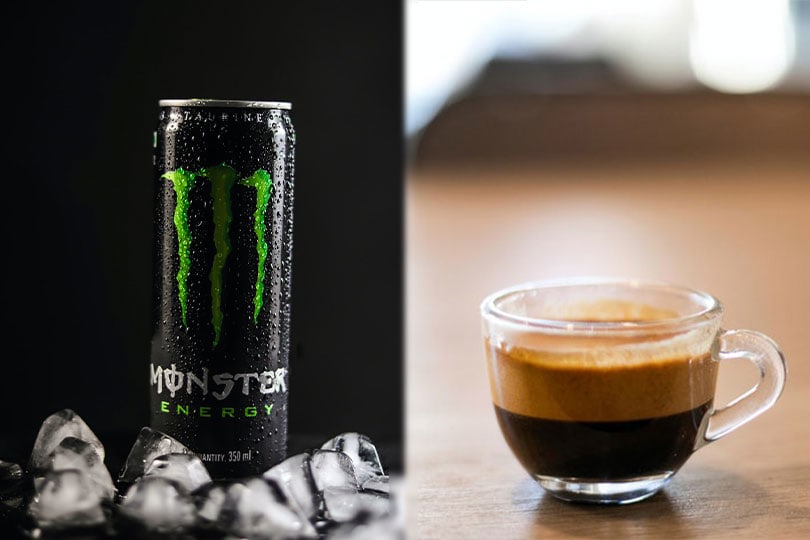Coffee has long been used to wake us up in the mornings and provide that jolt of energy to get through the rest of the day as the afternoon begins to wane.
At one time, coffee was the only preference in town if you wanted an afternoon pick-me-up. But, that’s no longer true, as there are several products and energy drinks today that give you a much-needed jolt.
However, which is better, coffee or energy drinks? Which one has more caffeine? By how much? We’ll compare the caffeine in Monster vs. coffee in this guide. By the end, you’ll understand whether you’ll be better off popping the top on a Monster energy drink or literally brewing a pot of coffee to settle in for that all-night study session.
A Quick Look Caffeine Content: Monster vs. Coffee
| Monster | Coffee |
| 160 mg per 16 oz | 95 mg per cup |
How Much Caffeine in Monster?
Monster energy drinks have 160 mg of caffeine per 16-ounce can. If you ingest 16 ounces of brewed coffee, then you would have consumed 180 mg of caffeine.
Monster energy drinks come in over 50 varieties, and a few have different caffeine amounts. For example, the Java Monster has over 300 mg of caffeine per can. But, of course, that’s on the high end, and then there’s the Monster Unleaded that has much less, at 20 mg of caffeine per can.
However, as previously stated, lots of the brand’s 16-ounce cans contain 160 mg of caffeine. The biggest problem with Monster that we’ve seen is that the caffeine is possibly synthetically crafted, and of course, natural caffeine is better for your health.
In a later on. section, we’ll talk more about where the caffeine content in Monster originates from.
How Much Caffeine in Coffee?
Now, what about coffee? While our table states that each cup of joe contains 95 mg of caffeine per cup, that’s not as definitive as you would think. Just as there are different varieties in Monster, there are likewise different varieties of coffee, and you also have to examine how the coffee was brewed and the coffee-to-water ratio.
For example, if you are a fan of concentrated coffee, you’ll utilize more coffee beans, which increases your caffeine content per cup. By the same token, if you make espresso coffee, you’re upping the caffeine degree by an ounce once again.
A single coffee bean contains 6 mg of caffeine, an 8-ounce caffeinated beverage has 95 mg, whereas a shot of espresso coffee has a whopping 64 mg per shot.
Where Does the Caffeine Come from in Monster and Coffee?
Now that we discover the caffeine content of the two beverages, we’ll talk about exactly where the caffeine comes from in the section below.
Where Does the Caffeine in Monster Come From?
While there’s nothing on the label that points to where the caffeine in Monster originates from, we suspect that it’s synthetic caffeine. Many of energy drinks contain synthetic caffeine, and Monster is probably no exception.
While natural caffeine and synthetic caffeine are almost chemically identical, the synthetic version goes through numerous steps to get to a form where it can be added to energy drinks. In contrast, natural caffeine does not require as much processing.
Where Does the Caffeine in Coffee Come From?
The caffeine in coffee is natural caffeine. However, it’s extremely the method of grinding the beans and brewing the coffee that activates the caffeine in your favorite morning cup of coffee.
Likewise, since you’re extracting the caffeine from the coffee bean, instead of just eating it whole, you’ll end up with less caffeine in your cup when you’re finished.
Caffeine in Monster vs. Coffee: The Bottom Line
So which one has more caffeine, Monster energy drinks or that morning caffeinated beverage? It seems that Monster has the the majority of of caffeine at 160 mg per 16-ounce can since a single cup of coffee only contains 95 mg. However, if you look at the brewing recipe and more, it gets a little bit bit bit cloudier.
The amount of caffeine is determined by the kind of coffee you beverage, the brewing procedure you choose, and the size of the Monster you buy, so in reality, how much caffeine you consume from either is totally up to you. But, the bottom line is that coffee is tastier and provides you your caffeine jolt naturally, so that’s the perfect way to go, in our opinion.
